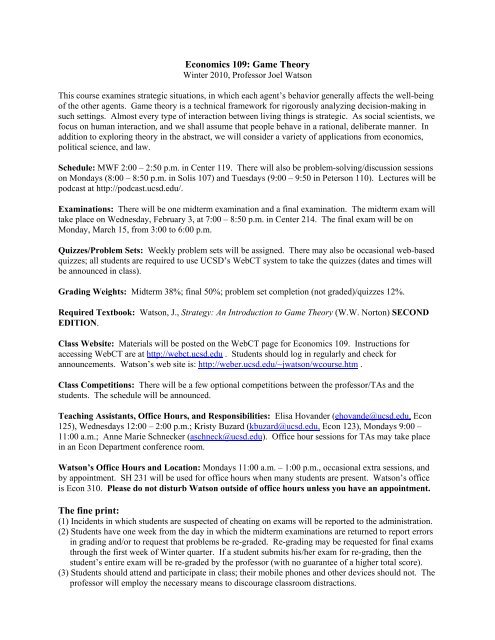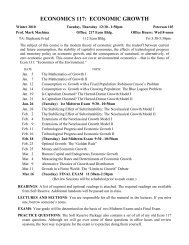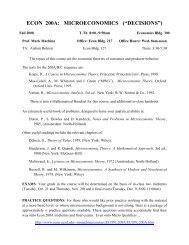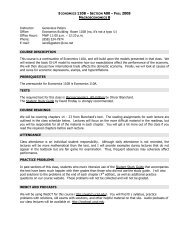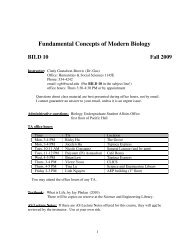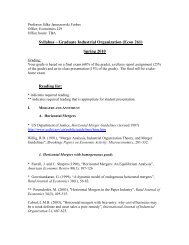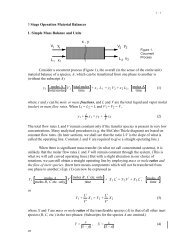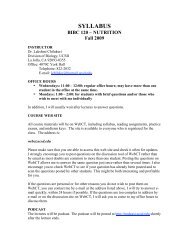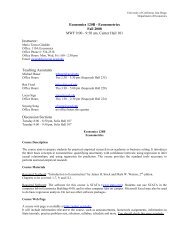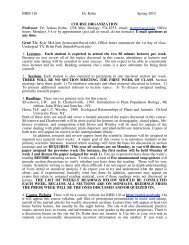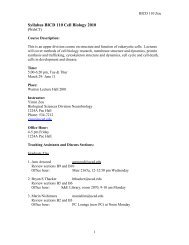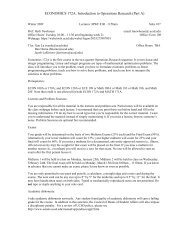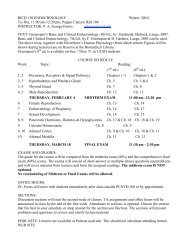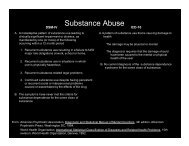Economics 109: Game Theory The fine print: - Courses
Economics 109: Game Theory The fine print: - Courses
Economics 109: Game Theory The fine print: - Courses
Create successful ePaper yourself
Turn your PDF publications into a flip-book with our unique Google optimized e-Paper software.
<strong>Economics</strong> <strong>109</strong>: <strong>Game</strong> <strong><strong>The</strong>ory</strong><br />
Winter 2010, Professor Joel Watson<br />
This course examines strategic situations, in which each agent’s behavior generally affects the well-being<br />
of the other agents. <strong>Game</strong> theory is a technical framework for rigorously analyzing decision-making in<br />
such settings. Almost every type of interaction between living things is strategic. As social scientists, we<br />
focus on human interaction, and we shall assume that people behave in a rational, deliberate manner. In<br />
addition to exploring theory in the abstract, we will consider a variety of applications from economics,<br />
political science, and law.<br />
Schedule: MWF 2:00 – 2:50 p.m. in Center 119. <strong>The</strong>re will also be problem-solving/discussion sessions<br />
on Mondays (8:00 – 8:50 p.m. in Solis 107) and Tuesdays (9:00 – 9:50 in Peterson 110). Lectures will be<br />
podcast at http://podcast.ucsd.edu/.<br />
Examinations: <strong>The</strong>re will be one midterm examination and a final examination. <strong>The</strong> midterm exam will<br />
take place on Wednesday, February 3, at 7:00 – 8:50 p.m. in Center 214. <strong>The</strong> final exam will be on<br />
Monday, March 15, from 3:00 to 6:00 p.m.<br />
Quizzes/Problem Sets: Weekly problem sets will be assigned. <strong>The</strong>re may also be occasional web-based<br />
quizzes; all students are required to use UCSD’s WebCT system to take the quizzes (dates and times will<br />
be announced in class).<br />
Grading Weights: Midterm 38%; final 50%; problem set completion (not graded)/quizzes 12%.<br />
Required Textbook: Watson, J., Strategy: An Introduction to <strong>Game</strong> <strong><strong>The</strong>ory</strong> (W.W. Norton) SECOND<br />
EDITION.<br />
Class Website: Materials will be posted on the WebCT page for <strong>Economics</strong> <strong>109</strong>. Instructions for<br />
accessing WebCT are at http://webct.ucsd.edu . Students should log in regularly and check for<br />
announcements. Watson’s web site is: http://weber.ucsd.edu/~jwatson/wcourse.htm .<br />
Class Competitions: <strong>The</strong>re will be a few optional competitions between the professor/TAs and the<br />
students. <strong>The</strong> schedule will be announced.<br />
Teaching Assistants, Office Hours, and Responsibilities: Elisa Hovander (ehovande@ucsd.edu, Econ<br />
125), Wednesdays 12:00 – 2:00 p.m.; Kristy Buzard (kbuzard@ucsd.edu, Econ 123), Mondays 9:00 –<br />
11:00 a.m.; Anne Marie Schnecker (aschneck@ucsd.edu). Office hour sessions for TAs may take place<br />
in an Econ Department conference room.<br />
Watson’s Office Hours and Location: Mondays 11:00 a.m. – 1:00 p.m., occasional extra sessions, and<br />
by appointment. SH 231 will be used for office hours when many students are present. Watson’s office<br />
is Econ 310. Please do not disturb Watson outside of office hours unless you have an appointment.<br />
<strong>The</strong> <strong>fine</strong> <strong>print</strong>:<br />
(1) Incidents in which students are suspected of cheating on exams will be reported to the administration.<br />
(2) Students have one week from the day in which the midterm examinations are returned to report errors<br />
in grading and/or to request that problems be re-graded. Re-grading may be requested for final exams<br />
through the first week of Winter quarter. If a student submits his/her exam for re-grading, then the<br />
student’s entire exam will be re-graded by the professor (with no guarantee of a higher total score).<br />
(3) Students should attend and participate in class; their mobile phones and other devices should not. <strong>The</strong><br />
professor will employ the necessary means to discourage classroom distractions.
Course Outline<br />
Topic Chapters in the textbook<br />
A. Representing <strong>Game</strong>s<br />
Extensive form, strategies 1 – 3<br />
Normal form, beliefs/mixed strategies 4 – 5<br />
B. Analysis of Static Settings<br />
Best response, rationalizability, applications 6 – 8<br />
Equilibrium, applications 9 – 10<br />
Other equilibrium topics 11 – 12<br />
Contract and law 13<br />
C. Analysis of Dynamic Settings<br />
Extensive form, backward induction, SPE 14 – 15<br />
Examples and applications 16 – 17<br />
Bargaining 18 – 19<br />
Negotiation equilibrium, examples 20 – 21<br />
Repeated games, applications 22 – 23<br />
E. Information<br />
Random events and incomplete information 24<br />
Risk and contracting 25<br />
Bayesian equilibrium, applications 26 – 27<br />
PBE, applications 28 – 29<br />
Not all topics/chapters will be covered.


